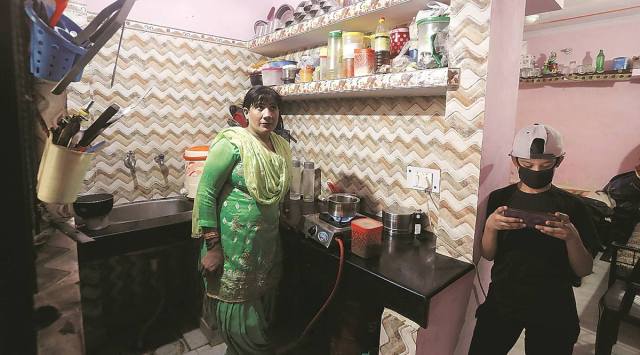- India
- International
Women out of work: ‘We were moving up the ladder and ab lagta hai kisi ne seedhi chheen li’
The Covid lockdown has set off sweeping economic distress in cities but its crucial dimension has remained untold: the silent, devastating toll on the working woman in the city suddenly out of work.
 Mehrunisa, 34, who lost her job as a bouncer at a Delhi bar during lockdown, at her rented house in Madangir. Amit Mehra
Mehrunisa, 34, who lost her job as a bouncer at a Delhi bar during lockdown, at her rented house in Madangir. Amit Mehra*A month into the lockdown after she lost her job at an energy policy institute that paid Rs 24,000 a month, 29-year-old Reshma, a post-graduate in social work, sent her four-year-old daughter to live with her parents. “I can’t afford to take care of my child if I don’t earn anything. I can’t afford a glass of milk a day for her… Sirf ek maa hi yeh dard samajh sakti hai,” she said. Her husband was unemployed for a year, and got a job at a petrol pump earlier this month.
*A 40-year-old private school teacher in south Delhi’s Sangam Vihar lost her Rs 12,000-per-month job in April. “There is a loan of Rs 40,000 to repay. I have borrowed money from 11 people. After five months, I got a job as a bouncer but the salary is poor… I am ashamed of this, my family has never seen such poverty.”
*Priya, 21, was a beautician earning Rs 10,000 per month plus tips in south Delhi’s Moolchand. She lost her job in the lockdown, her father lost his at a dry cleaning store. “We have no savings, just loans… I will take up any job.” Until she gets one, she’s cutting every corner at home. “In rations, CM Arvind Kejriwal is giving chhole so that’s all we eat. We are a middle-class family and instead of moving forward, we are going backwards.”
Read | An Expert Explains: The gender gap in job losses caused by the lockdown
The Covid lockdown has set off sweeping economic distress in cities but its crucial dimension has remained untold: the silent, devastating toll on the working woman in the city suddenly out of work.

In the capital, Reshma, the school teacher, and Priya tell that story. From first-time earners to sole breadwinners, beauticians, private school teachers, housekeeping staff, project supervisors, restaurant and bar staff – many are women proud to be the first generation in their families to work. Many left small towns to pursue — and discover — their aspirations in the city. Now locked out of the job market, they are being pushed to debt; some are selling off household items their incomes had helped buy, others are returning to places where they came from – all in desperate search for a job.
That search may take a while given the latest surge of Covid cases in the capital and Chief Minister Arvind Kejriwal’s decision to re-introduce curbs on gatherings at weddings, and his wish to be able to temporarily shut down markets if protocols are not followed.
That will surely be another blow for those already on the brink. Like Aarti Kashyap, 24, who has eight siblings, and a bed-ridden father at home. A project supervisor in a private institute in Delhi, she earned over Rs 25,000 a month, while her mother, who is a domestic help, brought in Rs 8,000 a month working homes in Jangpura.
In April, both lost their jobs. “I checked my bank balance, it was Rs 235. I have exhausted all my savings,” said Kashyap over the phone earlier this month. Her family sold an old TV and almirahs and has taken a loan of Rs 50,000 from a relative, and another Rs 30,000 from a local money-lender.
Opinion | Women and work
Kashyap’s is an illustrative case in a city where, as Deputy Chief Minister Manish Sisodia underlined, 60 per cent of the jobs are in the service sector which has been hit the hardest by the pandemic.
Speaking to The Indian Express, Sisodia said the consequences of the lockdown are only now beginning to show despite the pre-Covid safety net. “Our schemes such as free electricity, free water and free travel benefited a lot of women. People living in slums have told me this many times. (Now) there is hardship, no doubt. We had anticipated this and that is why the Chief Minister pushed for re-opening even when other cities were not doing it. Now everyone is doing it. Apart from the disease, there are issues such as starvation, mental stress, and joblessness.”
Which translates to a growing realisation for many working women that upward mobility they had aspired to achieve in a city of opportunity may be more elusive than ever.
“We saw the family struggle as my factory-worker father was the only breadwinner. When my brother and I started working, our financial status improved, we bought a bike,” recalled Kashyap. Chhote mote shauk poore kiye inn chhe saalo mein. We thought the struggle period was over and now we were going from a lower middle class family to a middle-class family… Look what 2020 has done to us, we are back to struggling.”
In Noida, 38-year-old Hemalata — who has a teaching experience of 15 years — is struggling for odd jobs to keep her afloat. A sports teacher with a private school, she got laid off when schools shut down. “Who wants to do PT online? Since April, I have borrowed Rs 30,000-Rs 40,000 and can only repay when I have a job. I have never seen such financial stress in my life. I haven’t been able to pay house rent, I have not paid my daughter’s school fee, and also had to pull out the children from tuition,” she said.
If family expenses weigh on Hemlata, it’s the price for being independent that’s turning out unaffordable for Pooja Divakar, 24, who came to Delhi three years ago from Bareilly. It was a move that took a toll on her relationship with her parents who didn’t want their daughter to move to a “big city.”
She found work that paid her Rs 23,000 a month, as a guest relations executive in a restaurant in the Garden of Five Senses. She lost that job in April and for six months, Divakar said, she cried herself to sleep worried sick about making room rent and helping out her college-going sister back home in Bareilly.
She ran out of savings and had to borrow Rs 8,000 from a former client to pay her rent. This month she got a job – but at a reduced salary. “There is no growth in a small town. My parents never imagined their child, that too a daughter, would move to Delhi. Here, there are options…I had saved up Rs 1 lakh to learn German at an institute in Connaught Place. I don’t want to work in restaurants my whole life, I want to be a translator. Now I will have to start all over again. The dream is farther away,” said Divakar.
How important is a job — and its salary check — in resisting family pressure and carving an independent space in the city is what 34-year-old Mehrunisha Shokat Ali knows well.
“I am from a conservative Muslim family of Saharanpur, where women aren’t allowed to work. I fought my father and brother first, then the neighbours, and then fought to be called a bouncer than a security guard.”
She had two jobs, a private bouncer to a businesswoman in Shahpur Jat in the afternoon, and at a busy bar in Hauz Khas Village late at night. With two jobs and tips, she said, she earned Rs 45,000-Rs 50,000 a month.
“When the money started coming in, I was the queen of the house. We weren’t poor…” she said. Until she lost her job in the bar in March and the businesswoman moved to Punjab.
“I had savings of Rs 3.5 lakh in my bank, and it’s all over,” said Ali. She hasn’t borrowed any money so far but each day in her Madangir home is marked by compromises she doesn’t want to make. “I have found a job but I don’t know how much they will pay, maybe Rs 15,000 a month. I will take it up, I have no option,” she said. “(One time) we were moving up the ladder and Ab lagta hai kisi ne seedhi chheen li hai.”
Apr 19: Latest News
- 01
- 02
- 03
- 04
- 05






































